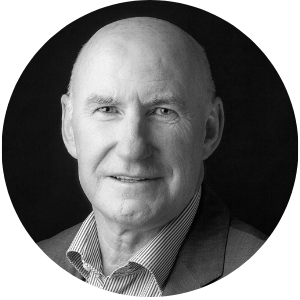We were thrilled to be joined by Jack Pringle, Architect at studio PRINGLE as our guest speaker at our recent Architecture & Interior Design Employment and Industry Update webinar. Jack is a highly experienced Architect with over 43 years of industry experience and is passionate about being active in the architecture industry. You may also recognise him as a previous RIBA President as well as the current Chair of the RIBA Board.

We were asked many important questions about employment and the industry and Jack expertly answered these utilising his personal experiences and insights. To follow on from the webinar we wanted to share these with you, and we hope that you find the answers interesting and thought-provoking.
I am in my early 50s at a mid to late-career level and have been out of work for almost nine months, without a single interview coming my way. I’ve never seen such a difficult job market. Are we seeing increased ageism in the current job market?
I can’t claim to be an expert in this. However, I am nearly 70 years old and I am just about to set up my next practice as a start-up. We’ve got a President of the United States of America who is nearly 80 years old, so I think you are a youngster in your 50s and have it all to play for.
It isn’t a surprise that there aren't a lot of interviews happening in this pandemic. Practices are scratching their heads, not sure whether they need to furlough staff or make them redundant and whether they can keep their businesses going. It is a huge struggle.
I would say to you, have faith, the job market will return. Our industries and associated ones are gagging to get going again and there will be a moment in time, like a starting pistol where everything gets back on the road. People have been busy making plans about their return and what they are going to do in their recovery. I think the return is going to be quite explosive.
Please persevere, and be optimistic and I am sure the job market will return soon. In terms of the age part – we need experienced people. In my businesses, it has been the combination of ages and experiences that has been the magic recipe. It makes wonderful new buildings and wonderful new interiors. You will be needed and have faith.
With the trend of working remotely, I have noticed that I have been working more and more efficiently. Will new ways of work and training be offered so that employers and employees can manage their own time as well as their mental and physical health? Many will also require high-end machines and an internet connection. Is this being offered or will it be part of the pay?
Great question. First of all, I think that we will move to a smarter way of working. Even if you do need to go into the office, you might not go in for the 8 am rush hour, you might decide to do a little bit of work at home and go into work for a meeting or training session. Also, if you have a late afternoon meeting across town, will you flog back to the office to do the last hour in the office? No, you’ll go straight home, and you’ll do an hour and a half at home, which is more efficient.
Do people need training on these things? Well yes, I think it is a very good idea because these things are all new and I think it is not only about training, but it is about agreeing on expectations. People need to know whether their staff are being managed or that managers are managing staff, that things are agreed upon, that it is allowed, and that its expected behaviour. That distresses the whole environment and makes it more positive.
So yes, I think training and agreed protocols are going to be important. The point you made about decent Wi-Fi at home and decent laptops, I agree. I think we saw that at the beginning of this pandemic, the difference between the businesses that had high-spec laptops and had their systems in the cloud, they went home and worked efficiently from the get-go. Other businesses, noticeably some client businesses that had more old-fashioned systems and desktop computers, scrambled to work remotely efficiently. There is also the question of how safe is your workplace at home? And that has to be taken into account going forward, and I think employers probably have a responsibility there.
Will Brexit increase competition for jobs amongst UK-based Architects? And in turn increase wages?
I’ll nail my colours to the mast and half of you out there won’t agree with me and that’s just fine, but I think Brexit is the most extraordinary example of self-mutilation that any country has ever been through. We now have this double-whammy of the pandemic and Brexit at the same time.
Our poor fisherman, who were meant to have this great deal because they could fish in more waters, end up not being able to transport any of their products to the markets that want them, and that’s just the tip of the iceberg. However, I think your point is that in the past there has been a free labour market coming in from the EU, we’ve had a lot of EU Architects coming into our offices and they will now only be able to come in through visas. Visas can be quite expensive to process through legal fees.
So, will UK Architects and Designers be more in demand? I think they must be; I think you absolutely could be right there. Will there be pressure on fees to be more competitive? Well, I think that could be the case too. I don’t think we are a very well-paid profession, so if there was pressure on salaries and that could be recouped through fees or efficiency, I think that would be great.
Do you think there is a de-skilling element to the pandemic, for those who are already into their career due to the lack of site visits and not having the opportunity to see the reality of what they design? How can it be addressed?
I think there must be an element of learning more slowly if you can’t get into site visits. I know some site visits have been facilitated but I guess a lot of others haven’t, so I think that is a natural consequence of that. I think you know the answer to the question, we are going to have to play catch up and when we come out of this, I’m sure there will be a lot of that. But it is what it is, and we just have to do the best we can.
What tips can you offer newly qualified graduates of design (interiors and architecture) on finding new opportunities amidst a pandemic when studios are working remotely, projects are on hold and experienced designers are being made redundant and coming back onto the job market, increasing competition?
Well, Martin, you know I’m sure you expect me to say, “sign up with FRAME and they’ll find you the right berth”. I always think that at any stage in their careers, Architects are essentially camp followers. We follow the money; we follow the activity. So, what I encourage people to do, providing they have an interest in these sectors is to look at the sectors that are conspicuously doing well, particularly at this moment or in the immediate future. That has to be healthcare, that has to be pharmaceutical and that has to be infrastructure, where government money is going to be piled into shovel-ready projects as quickly as they can.
I think you have to be smart, you are all clever people, most of you have two degrees, you should be able to do this. Figure out where the action is and make a pest of yourself to those offices, to see if you can go and help them.
We will then move into a second phase as we come out of this recession and even sectors that have been heavily hit, like hospitality will have a lot of work in them because there will be a huge amount of money around, looking for opportunities and all those hospitality businesses, the hotels, the bars, the restaurants that have gone bust will be refinanced either by their existing owners or by new ventures. A lot of them will have to be rebuilt, so there is going to be a lot of activity, arguably in unlikely sectors, once we start to come out of this pandemic because of the huge amount of money there is available for investment.
Given so many people have been out of work for six-nine months, will employers still give people a chance as they have such big gaps on their CVs? Will employers still care about gaps in your CV?
I think everyone is going to be very understanding of gaps in C’s. This is the most extraordinary event that has happened in all our lifetimes and I think it is extremely understandable about gaps in CVs. In normal times, I think employers were a little bit quizzical, What has this person been up to? What have they been doing for nine months at Her Majesty’s pleasure? But right now, I don’t think so.
I was made redundant from my hospitality Senior Interior Design role in Manchester, I would be interested to know what part of the country you think industry design opportunities will pick up first, and in what sector?
Well, that is interesting, isn’t it? I think it depends on how flexible you are. I don’t think I am more qualified than anybody else to say whether the capital will pick up more quickly than Manchester or Birmingham or Glasgow etc. but I did say that I think there is going to be quite a lot of work in things like pharmaceuticals and healthcare. I know from my own work that one of the things that are lacking, particularly in healthcare is good interior design. A lot of healthcare teams are looking for people who would be prepared to come in and help them design beautiful clinics, beautiful hospitals, and spaces that would make people feel valued and comfortable. Most healthcare teams do not necessarily have those skillsets on board, so you might look in unusual places and then, of course, you need to look at who is turning around the hotels, the bars etc, more quickly than others.
We would like to thank Jack Pringle for being so candid and providing his expertise and predictions of the future of the Architecture and Interior Design sectors.
Join the conversation with FRAME Recruitment
Follow FRAME Recruitment on LinkedIn, Facebook and Twitter for the very latest news, updates, exclusive insights and regular hot jobs in the architecture and interior design sectors.







